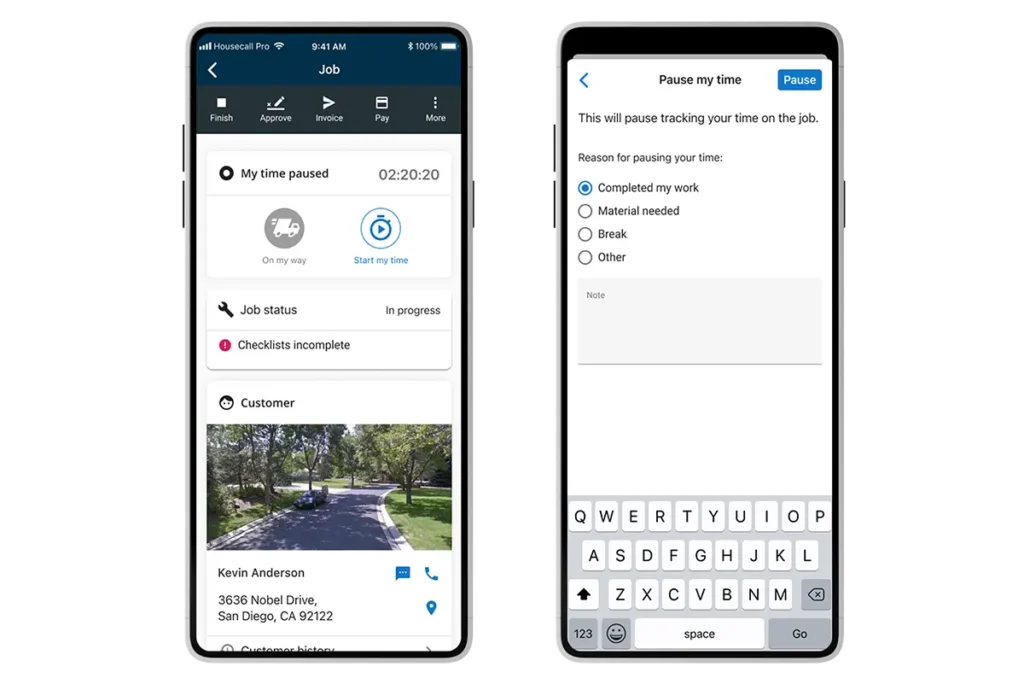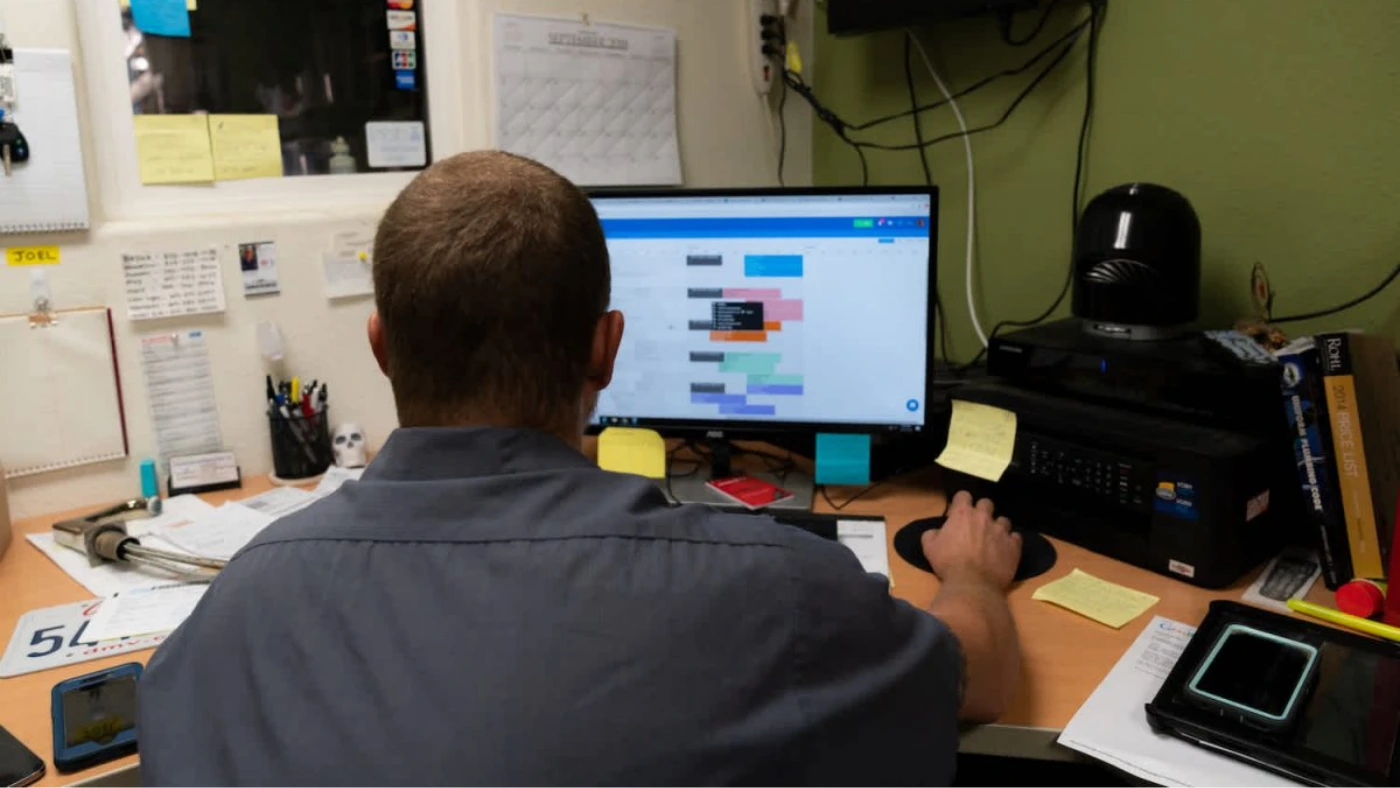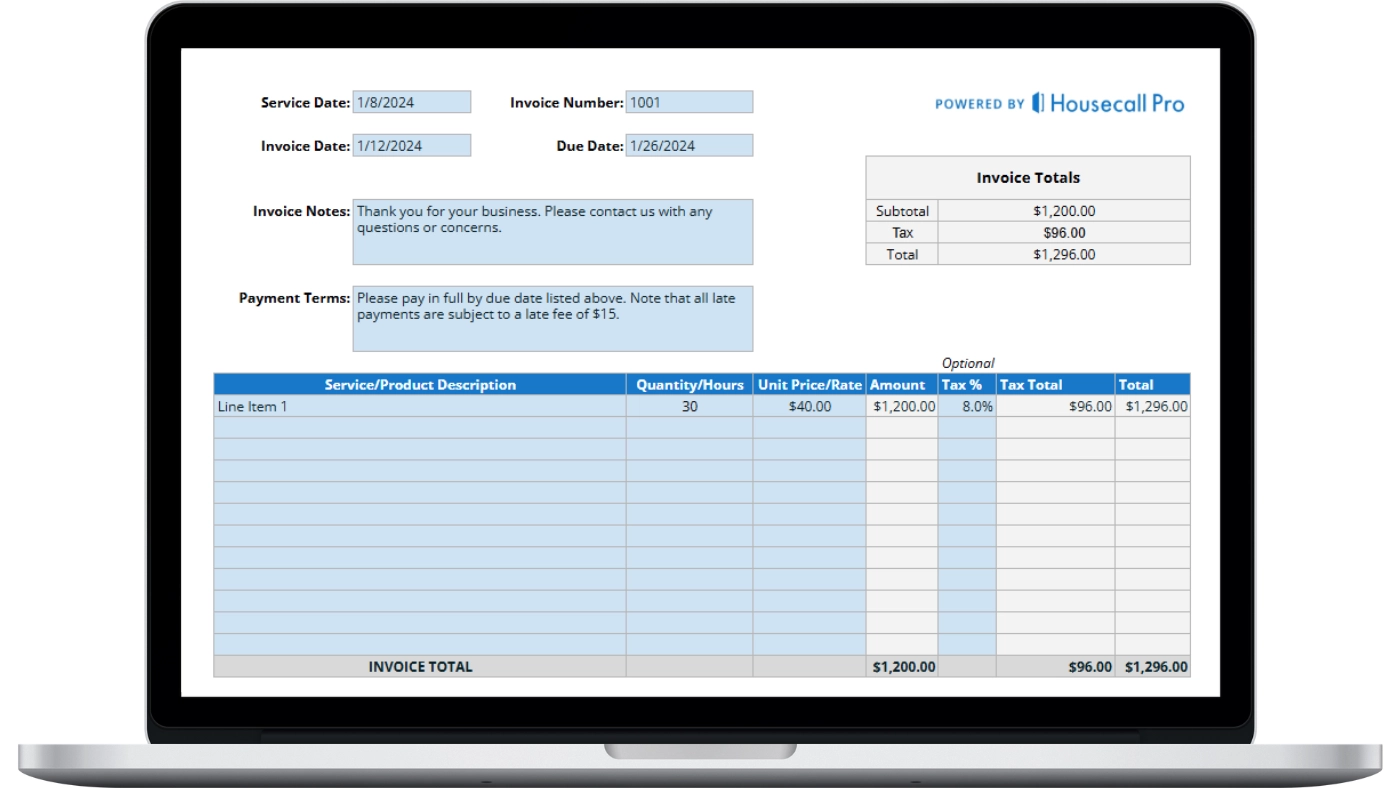Spending too much time on admin work?
Automate your daily tasks and save time with our home service software.
Want to win more jobs with less effort?
Grow your business and send quick quotes with our home service software.

Punctuality in the home service industry isn’t just a preference—it’s a necessity. Your clients expect timely service, and if your technicians don’t arrive on time, meeting those expectations is impossible. The entire workflow hinges on your technicians showing up as scheduled.
Unfortunately, addressing employee tardiness can be more complicated than it seems, especially when valuable, highly skilled team members are involved. You need to strike a balance between company policies and recognizing each employee’s unique strengths, which, sometimes, is no easy feat.
Here, we break down how to address employee tardiness with proven tips from industry pros who have faced this challenge head-on. With these tips and actionable strategies, you can reinforce punctuality while promoting respect and fairness within your own team. Here are a few real-world tips from actual industry pros to help you navigate the delicate art of effectively managing tardiness.
Why Punctuality Matters in the Home Services Industry
“They’re great techs otherwise… But it’s frustrating when they’re late.” — Mike Pec, All-Star Contributor
Sound familiar? You might have a few stellar employees that are, unfortunately, chronically late.
While one or two late days here and there aren’t a big deal, constant late arrivals can spiral into bigger problems. They can get in the way of your streamlined business operations, affecting the entire day’s workflow, throwing off schedules, and possibly even leading to customer dissatisfaction.
Unfortunately, if those chronically late employees are also some of your best workers, you might find yourself at a crossroads. Many managers face this issue of valuable employees who are prone to tardiness.
So, how do you fix it? You need to address the issue tactfully through policies that set clear expectations and consequences. This way, you can address the problem without sacrificing team morale or losing good workers.
Insights from the Pros on Managing Employees’ Tardiness

Keeping tardiness in check can seem like a near-impossible feat, but it doesn’t have to be. Here are a few tips and tricks from the pros:
1. Adjusting Start Times: Flexibility as a Solution
“Some people thrive at 6 a.m., and some don’t. Moving one tech’s hours to later actually boosted his performance.” – Nicholas DeLuca
Everybody is different. Some folks are early birds; others are night owls. So, you might find that some employees struggle with early mornings or late nights, especially if they naturally lean toward the opposite sleep schedule.
Adjusting start times can greatly benefit techs who struggle with early starts. You might have your early bird employees cover the morning shifts and have those who struggle with early mornings come in a bit later (and maybe stay a bit later). This can lead to improved performance and a happier team overall.
Of course, this might not always work. If your business operates in a standard 9 a.m. to 5 p.m. window, flex scheduling might not work.
But if you have lengthier opening hours, such as 7 a.m. to 7 p.m., you might be able to work in flex scheduling to accommodate varying shift needs.
2. Offering Small Bonuses for Punctuality
“We add a small bonus if employees are on time every day of the pay period. It’s simple but effective.” – Oliva Lauren Martin
Adding a sprinkle of incentivization to the mix via bonuses can be a great motivator to get to work on time. It makes getting to work on time feel rewarding rather than restrictive, which can be an excellent way to boost employee punctuality without going the disciplinary route.
These bonuses don’t have to be huge. Even small bonuses can motivate employees to get to work on time. For example, you might offer an extra $50 for employees who get to work on time every day each pay period.
Structure your bonuses however you’d like. Set it up to reflect your pay schedule, such as weekly or bi-weekly, ensuring you keep it fair across the board for all team members.
Learn more: Pay your team, track their hours, and manage bonuses, commissions, and PTO with Payroll from Housecall Pro.
3. Implementing a Progressive Discipline Approach
“First tardy, a written warning. Next, a day off without pay.” – Paul S. Gutierrez
While life can get in the way of being on time, it doesn’t mean every tardiness, especially frequent occurrences, is excusable. Being late every once in a while is usually no issue, given that it often stems from something out of the employee’s control. When it becomes a persistent problem, you, as the business owner, need to take action.
This is where a clear, structured disciplinary approach comes in. These outline definitive disciplinary actions for tardiness, ensuring everyone is on the same page about what happens after repeated lateness. It shouldn’t be overly punitive but rather address the occurrence in levels.
With this policy in place, you reinforce punctuality without demotivating employees through overly strict and unforgiving policies.
4. Enforcing a Fair Attendance Policy
“If you do nothing, you’re giving everyone else a pass.” – Bonna Stille Sayler
Once you create an attendance policy, you need to stick to it. Keep things consistent and transparent, emphasizing the importance of punctuality across the team. This creates clear expectations for everyone, outlining definitive consequences for tardiness, particularly repeated tardiness.
If you don’t have clearly defined expectations and consequences, you can’t expect your employees to follow them. You need to explicitly define what is acceptable and what isn’t, laying the foundation for disciplinary action for repeated lateness.
And when someone is tardy, whether the first time or the fourth time, it’s important to follow through on your policy. While it’s okay to be understanding of your employee’s situation, it’s still important to adhere to your policy.
If the problem persists after multiple warnings and other disciplinary action, you may need to let that employee go.
How Tardiness Affects Team Morale and Fairness
Unchecked tardiness isn’t fair or respectful to you, your business, or your clients, but it often affects other employees the most. When certain employees consistently arrive late without consequences, it can create frustration and resentment among those who consistently arrive on time.
Your inaction could be perceived as favoritism or a lack of accountability and may even lead on-time employees to feel that you don’t value their efforts and dedication as much.
On top of that, certain employees arriving late may shift the workload disproportionately onto on-time employees’ shoulders, leaving them to pick up the slack left by the late employees.
Over time, this can whittle away your employees’ trust in you and your management skills. This can snowball, weakening team cohesion and morale, eventually affecting productivity and service quality and, ultimately, client satisfaction.
Tardiness has a huge impact on team morale and fairness. While a few tardies here and there might not cause any issues, repeated lateness can quickly foster not-so-great problems.
The Pros’ Perspectives
Jennie Karn has shared her experiences with this issue. She discussed the importance of tracking lateness to convey the cumulative effect of just a few minutes. Karn shared how communicating the sum of those few minutes to the tech can give them a better idea of how their lateness impacts the business.
“When you break it down, those few minutes add up to hours over the month,” she noted. Being transparent helps techs understand why punctuality matters.
This sentiment is shared across the board, with many pros echoing similar thoughts. When one tech is consistently late, it can leave punctual team members feeling frustrated and undervalued. Many pros emphasize the importance of enforcing punctuality in maintaining team morale.
Punctuality shows respect for the company and coworkers. Enforcing your attendance policy consistently builds unity and sends the message that everyone’s time is valuable.
Learn more: Grab a copy of our employee handbook template outlining company policies, including attendance & punctuality requirements, so employees know what is expected of them.
How to Reduce & Handle Employee Tardiness: 5 Actionable Tips
Addressing employee tardiness might sound easy enough at a glance, but in reality, it takes tactful, intentional action. Here are a few tips to help you address employee tardiness:
Tip 1: Set Up a Progressive Discipline Policy
Defining the consequences of persistent lateness is a must. If there are no repercussions for being late, there’s nothing to deter employees from constantly arriving late. So, take the time to draft a written policy with progressive disciplinary action.
Define what constitutes tardiness in clear terms (such as arriving more than 10 minutes late). Outline tiers of discipline for each additional tardy.
The first step might be a verbal warning as an informal reminder. The second might be a write-up, providing a formal reminder. If the tardiness continues, you might implement a formal meeting or probationary period and, if needed, suspension or termination.
Keep things fair and clear, outlining expectations while providing room for discussion. Afterward, have all employees read and sign it to signify they’ve read and understand the terms. From there, enforce it consistently to maintain credibility and fairness across the board.
Tip 2: Consider Flexible Start Times for Those Who Need It
While you might be up and at ‘em at 5 a.m. without an issue, some of your employees might struggle to get up and arrive for early morning shifts. Some may have unique personal responsibilities that get in the way of early morning arrivals.
If that’s the case, offering flexible start times, such as staggered shifts, can be a practical solution. Let your early riser employees take the early morning shifts and leave the later shifts to those who thrive in the later hours or have busy mornings. This way, you can improve morale and overall efficiency.
You’ll need to chat with your employees to determine who might want to work what shifts. Tweak scheduling as needed and monitor punctuality and output from there. It might take some trial and error, but in time, the accommodation can lead to timeliness, improved job satisfaction, and a more dedicated team.
Tip 3: Use Bonuses to Incentivize On-Time Arrivals
If punctuality is a problem, how do you reduce employee tardiness? Bonuses may help.
A straightforward bonus structure can go a long way in reinforcing the importance of punctuality. If a bonus plan is feasible for your business, develop a structure that offers incentives for employees who consistently arrive on time.
It doesn’t necessarily have to be cash (although it definitely can be) and could be gift cards or even specific items. Make it work for you and your business to encourage friendly competition and boost punctuality.
Remember to communicate the bonus structure clearly, including what qualifies for it, how you’ll track it, and when you’ll distribute rewards. If you use a time-clock app, you can easily keep track of hours (including who is late) through there.
Tip 4: Provide Regular Feedback and Recognition
Frequent feedback, both positive and constructive, can be a great way to reinforce expectations and motivate employees to improve.
Take a few minutes to routinely acknowledge those who consistently arrive on time. You do this by publicly praising them in a team meeting or sending a quick “thank you” email, both of which can build positive reinforcement.
For those who struggle with punctuality, checking in with them can help both of you stay on the same page. If you notice they’ve been late for a day or two, spend a few minutes with them in a one-on-one check-in to address the challenges before they become chronic issues.
Both of these actions create a continuous feedback loop that not only helps keep employees aware of their progress but also communicates that you notice and appreciate their efforts.
Get In Touch: 858-842-5746
Let us earn your trust
On average, Pros increase monthly revenue generated through Housecall Pro by 50% after their first year.
See plan options and feature breakdown on our pricing page.
Tip 5: Address Team Morale Regularly to Maintain Unity
Building a positive work culture where punctuality is a priority starts with regular team morale and check-ins. This action goes hand-in-hand with the feedback loop but instead focuses on feedback at a team level.
When employees feel respected and heard, they’re more likely to adhere to company policies, including attendance expectations. So, schedule team meetings or informal feedback sessions to hear your employees’ points of view on various topics, such as attendance.
Listen to their concerns and challenges to promote a supportive and understanding environment. Acknowledge their hard work and reinforce the importance of punctuality. If your employees feel that your attendance policy is unfair or unreasonable, listen to their concerns and address them accordingly.
Taking a collective approach at a team level fosters accountability while emphasizing the importance of being on time.
How to Write Up an Employee for Tardiness Email Letter Sample
Writing up an employee for tardiness doesn’t require an elaborate or lengthy letter. You can keep it simple, sticking to the facts in a concise and straightforward letter. Incorporate key details about the problem, keeping your tone of voice calm and neutral.
Your letter might look something like this:
Subject: Your Punctuality and Attendance
Dear [Employee Name],
I wanted to reach out to discuss something important regarding attendance. I’ve noticed you’ve been arriving late recently, and I want to address this with understanding and support. I understand that things may come up, and lateness occasionally can be unavoidable. However, when these delays become a regular occurrence, they can affect our schedule and the team’s efficiency.
At [Company Name], punctuality is integral to ensuring client satisfaction and team coordination. We rely on everyone being on time so we can provide the best service to our clients and keep daily operations running smoothly. Punctuality is a must to follow through on these commitments, and we count on everyone to be here and ready at the start of their scheduled shift.
If anything is preventing you from arriving on time, please let me know. We can explore options that may better suit both parties, such as later start times. If there’s no specific issue, I would greatly appreciate it if you could try to improve your punctuality.
Please let me know if you’d like to discuss this further or how I can support you in meeting your schedule.
Thank you for your understanding and attention to this matter.
Best,
[Your Name]
[Your Position]
[Company Name]
Customize the letter to meet your business’s needs. Shorten it, switch up the details, include specific consequences that accompany the number of late days, or include possible remedies that you could offer to help address the problem. This letter is an example to help get the ball rolling but feel free to tweak it to make it yours.
Next Steps in Dealing With Habitually Late Employees
Punctuality is integral to maintaining efficiency, client satisfaction, and team morale in any home service business. To effectively address issues with tardiness, you’ll need to take a multi-faceted approach that balances company expectations with understanding individual circumstances.

This is where software can help your staff increase efficiency, encourage accountability, and track total hours spent on jobs with the time-tracking feature from Housecall Pro. Employees can clock in and out easily from the Housecall Pro mobile app and see their time logged each week.
Time tracking and disciplinary measures can look different for every company, from incorporating a progressive disciplinary policy and flexible start times to incentivizing on-time arrivals. Regardless of your choice, you need to design your policy to fit your team’s unique needs.
Remember, the best results often come from combining different approaches that create a fair and supportive environment. Feel free to tinker with and refine your methods as you learn what works best for your team.
As the saying goes, “Sometimes, flexibility is the best policy.” – Critical Appliance Services
Employee Tardiness FAQs
-
How do you discipline an employee for tardiness if they’re a good worker overall?
-
Being a good worker doesn’t make up for persistent tardiness, but at the same time, you don’t want to lose a good worker because they struggle to show up at or before start time. So, start with a conversation about their lateness and explore whether flexible start times may help. If that doesn’t work, implement a gentle but clear disciplinary approach.
-
What’s the best way to set up an attendance policy?
-
Create a straightforward written attendance policy. Brief all employees on the new policy and integrate it into your new employee onboarding process to ensure all team members are well aware of it. If you have an employee handbook, remember to add it there, too. This way, there are no surprises, and everyone knows the expectations surrounding timeliness.
-
How can I avoid making punctuality rules feel too strict?
-
To avoid making punctuality rules feel overly rigid, consider trading punitive action for positive reinforcement. You might integrate bonuses for punctuality, making being on time a reward. Of course, that doesn’t mean you shouldn’t exercise leniency for all tardiness—if it becomes a repeated issue, disciplinary action may be necessary to deter such lateness in the future.
-
Can an employee be fired for tardiness?
-
Absolutely. Repeated tardiness can take its toll on your business and employees, affecting everything from productivity to your company’s reputation (customers typically appreciate it when you’re on time). If the issue continues, you may need to fire the employee due to a breach of company policy.
-
What is considered excessive lateness?
-
Most companies define excessive lateness as frequent tardiness that disrupts productivity. Many set a specific limit, such as being late three or more times in a week, but the specifics may vary from one workplace to the next. Set up your own policy that fits your business’s needs and expectations—this isn’t a one-size-fits-all solution






